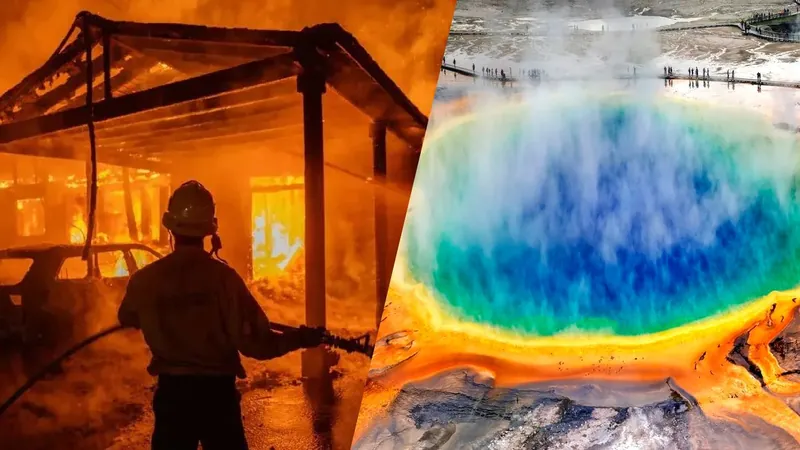
This Week in Science: Apocalyptic Weather, Yellowstone's Secrets Revealed, and Ancient Egyptian Discoveries
2025-01-11
Author: John Tan
This week, the science world has been rocked by a series of extreme weather events that seem straight out of a disaster movie. From severe blizzards to raging wildfires, the effects of climate change have never felt more urgent.
In Los Angeles County, wildfires have spiraled out of control, consuming over 30,000 acres (12,000 hectares) and tragically claiming at least 10 lives while destroying more than 10,000 homes and structures. In stark contrast, the East Coast and Midwest experienced extreme cold, with record-breaking low temperatures leading to snowfall that has disrupted daily life.
Adding to the grim news, America recorded its first bird flu death this past Monday, a stark reminder of the ongoing threat posed by contagious diseases.
The Yellowstone Volcano: Where Will It Erupt Next?
In a fascinating twist, scientists have turned their attention to Yellowstone National Park's supervolcano, which last erupted about 70,000 years ago. While experts say it’s unlikely to erupt again for hundreds of thousands of years, research into the volcano's magma storage has indicated that future eruptions may only be plausible in one specific area on the park's northeast side. This groundbreaking finding provides insight into volcanic activity and helps scientists better understand the potential hazards posed by this famous geological formation.
Ancient Egyptian Medical Marvels Unearthed
Shifting to archaeology, a monumental discovery in Saqqara, Egypt, has revealed a 4,100-year-old tomb belonging to a doctor who treated pharaohs. The tomb's inscriptions identify the physician as Tetinebefou, a specialist believed to have protected against poisonous bites. Interestingly, he held the rare title of "chief dentist," making this find particularly significant in understanding ancient medical practices.
More Scientific Developments
In additional science news, an incredible 800-mile-long ‘DUNE’ experiment is underway, aimed at uncovering hidden dimensions of the universe. Meanwhile, researchers have isolated 'reanimated' herpes viruses from the brain, establishing a potential link to concussions and dementia. A new study has shown that most of the atoms in our bodies left the Milky Way on a 'cosmic conveyor belt' long before our births and a recently discovered parasite has displayed a concerning resistance to ivermectin, raising alarms in medical circles.
Time Travel: A Theoretical Breakthrough?
In an adventurous foray into theoretical physics, a Vanderbilt University physicist claims to have addressed the perplexing 'grandfather paradox,' presenting a method through which time travel could be reconciled with established laws of physics without contradiction. This breakthrough could change our understanding of time and space.
Natural Wonders and Other Mysteries
And for those intrigued by natural phenomena, a mountain in Antarctica resembling the Great Pyramids has sparked wild conspiracy theories. Could it be a remnant of a lost civilization, or is it just mother nature’s oddities on display?
As we delve into these enlightening stories, one thing is clear: the intersection of extreme events and scientific discovery paints an ever-evolving picture of our world. Keep exploring with us for more revelations on nature, humanity, and the limits of our understanding.






 Brasil (PT)
Brasil (PT)
 Canada (EN)
Canada (EN)
 Chile (ES)
Chile (ES)
 Česko (CS)
Česko (CS)
 대한민국 (KO)
대한민국 (KO)
 España (ES)
España (ES)
 France (FR)
France (FR)
 Hong Kong (EN)
Hong Kong (EN)
 Italia (IT)
Italia (IT)
 日本 (JA)
日本 (JA)
 Magyarország (HU)
Magyarország (HU)
 Norge (NO)
Norge (NO)
 Polska (PL)
Polska (PL)
 Schweiz (DE)
Schweiz (DE)
 Singapore (EN)
Singapore (EN)
 Sverige (SV)
Sverige (SV)
 Suomi (FI)
Suomi (FI)
 Türkiye (TR)
Türkiye (TR)
 الإمارات العربية المتحدة (AR)
الإمارات العربية المتحدة (AR)